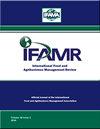Finding the right price: supply chain contracts as a tool to guarantee sustainable economic viability of organic farms
IF 1.5
4区 经济学
Q3 AGRICULTURAL ECONOMICS & POLICY
International Food and Agribusiness Management Review
Pub Date : 2022-01-24
DOI:10.22434/ifamr2021.0103
引用次数: 4
Abstract
The aim of this study is to analyse the volatility of agricultural commodity prices and assess the effectiveness of supply chain contracts as possible tools to prevent it. The study refers to the cereal sector, which is of vital importance for the agri-food system of the Mediterranean area. Since Italy is the world’s largest producer of durum wheat semolina, the proper functioning of the Italian durum wheat supply chain is central to this investigation. The study was conducted following two different paths of analysis: (1) the calculation of volatility indices using annual and monthly data of durum wheat prices, both organic and industrial, observed in the Bologna Commodity Exchange (AGER); (2) the analysis of two organic durum wheat supply chain contracts, defined by a cooperative involving hundreds of Italian farms mainly from the Marche region and by an agricultural consortium operating in the Adriatic regions. Despite the limited number of cases examined, the present study shows how supply chain contracts can be valid tools for building stable relationships between the various players, from production to processing and distribution, guaranteeing farms fairer and more remunerative raw material purchase prices and higher quality standards.寻找合适的价格:供应链合同作为保证有机农场可持续经济可行性的工具
本研究的目的是分析农产品价格的波动,并评估供应链合同作为可能防止它的工具的有效性。该研究涉及谷物部门,这对地中海地区的农业食品系统至关重要。由于意大利是世界上最大的硬粒小麦粗面粉生产国,因此意大利硬粒小麦供应链的正常运作是本次调查的核心。本研究采用两种不同的分析路径:(1)利用博洛尼亚商品交易所(AGER)观察到的有机和工业硬粒小麦价格的年度和月度数据计算波动性指数;(2)对两份有机硬粒小麦供应链合同的分析,其中一份合同由一家主要来自马尔凯地区的数百家意大利农场组成的合作社定义,另一份合同由一家在亚得里亚海地区经营的农业财团定义。尽管研究的案例数量有限,但目前的研究表明,供应链合同如何能够成为在各个参与者之间建立稳定关系的有效工具,从生产到加工和分销,保证农场更公平、更有利可图的原材料采购价格和更高的质量标准。
本文章由计算机程序翻译,如有差异,请以英文原文为准。
求助全文
约1分钟内获得全文
求助全文
来源期刊

International Food and Agribusiness Management Review
AGRICULTURAL ECONOMICS & POLICY-
CiteScore
2.90
自引率
0.00%
发文量
0
审稿时长
>12 weeks
期刊介绍:
The IFAMR is an internationally recognized catalyst for discussion and inquiry on issues related to the global food and agribusiness system. The journal provides an intellectual meeting place for industry executives, managers, scholars and practitioners interested in the effective management of agribusiness firms and organizations.
IFAMR publishes high quality, peer reviewed, scholarly articles on topics related to the practice of management in the food and agribusiness industry. The Journal provides managers, researchers and teachers a forum where they can publish and acquire research results, new ideas, applications of new knowledge, and discussions of issues important to the worldwide food and agribusiness system. The Review is published electronically on this website.
The core values of the Review are as follows: excellent academic contributions; fast, thorough, and detailed peer reviews; building human capital through the development of good writing skills in scholars and students; broad international representation among authors, editors, and reviewers; a showcase for IFAMA’s unique industry-scholar relationship, and a facilitator of international debate, networking, and research in agribusiness.
The Review welcomes scholarly articles on business, public policy, law and education pertaining to the global food system. Articles may be applied or theoretical, but must relevant to managers or management scholars studies, industry interviews, and book reviews are also welcome.
 求助内容:
求助内容: 应助结果提醒方式:
应助结果提醒方式:


